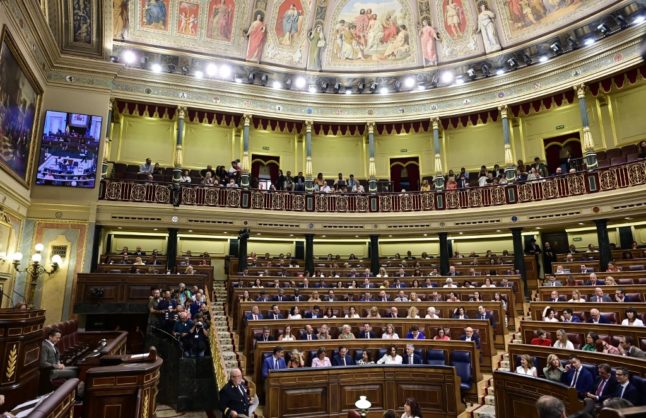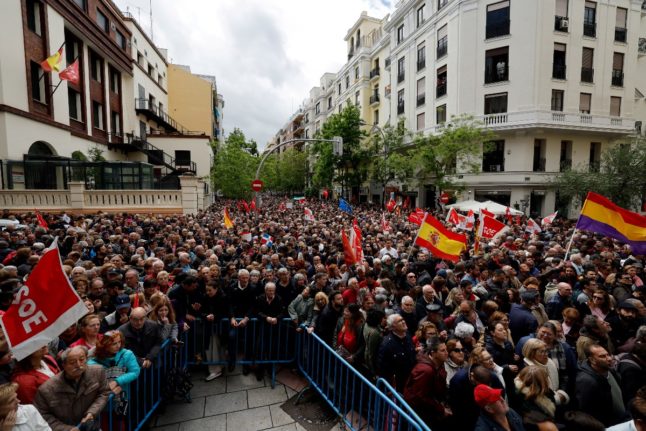On Tuesday 19th September the use of regional languages in the Spanish Congress officially begins.
Catalan, Galician and Basque will now be used as ‘co-official’ languages in the national legislature, while their recognition at the European level is also being considered by other member states.
The use of regional languages in Spain’s Congress is a politically controversial issue, both in how their introduction in Congress first came about following the aftermath of Spain’s inconclusive July general elections, namely political horse trading by separatist forces in Spanish politics, but also in their implementation.
Setting up the linguistic and translatory infrastructure for three additional languages will be costly, a lengthy process, and could have a significant impact on the functioning of the chamber.
READ ALSO: Catalan separatist leader wants Spanish ‘amnesty’ for independence activists
Why is it happening?
The introduction of Catalan, Basque and Galician as co-official languages in the Spanish Congress stems fundamentally from the political bargaining that followed Spain’s inconclusive July general election, which failed to produce a governable majority for either the ruling Socialists (PSOE) or Partido Popular (PP).
After the centre-right PP and far-right Vox both underperformed in the poll, the Spanish right lacked any realistic route to a workable majority. Despite that, PP leader Alberto Núñez Feijóo will attempt an investiture vote on September 26th, something almost certain to fail.
The Socialists, on the other hand, have more flexibility and a greater number of potential political allies. This is where the regional languages come in. In short, Spain’s regional parties have made their hypothetical support for another PSOE government conditional on the introduction of co-official languages, among other demands.
Following the general election, acting Prime Minister Pedro Sánchez was forced to turn to Spain’s regional and separatist parties, primarily in Catalonia, in order to try and form his own governable majority.
It was a condition of Catalonian separatists, namely Junts per Catalunya, led by the exiled leader of the region’s failed 2017 independence bid Carles Puigdemont, for their support of PSOE candidate Francina Armengol in her election as Congress Speaker.
READ ALSO: Carles Puigdemont, Spain’s separatist kingmaker
The PSOE’s decision to nominate Armengol, herself a Catalan speaker and former regional president of the Balearic Islands, was widely interpreted as a nod to separatist forces as potential government negotiations rumbled on.
Catalan separatists also demanded that Spain’s regional languages be recognised at the European level. Hoping to woo independence movements, Sánchez made a speech requesting that the EU recognises Catalan, Basque and Galician and adds them to its 24 official languages.

However, it seems unlikely. On the same day the regional languages arrive in the Spanish Congress, the EU’s 27 member states are meeting this Tuesday to gauge the opinions of other member states, although Sweden has already declared its “doubts”. Many member states fear that recognising the Spanish languages will lead to domestic political pressure from minority and separatist forces in their own countries.
In Spain too, the use of co-official languages has proved controversial. The PP has already criticised the move and ruled out that any of its members of Congress will use them, claiming that they would not “make a fool of themselves” or “do strange things” when all members, regardless of where in Spain they come from, share the common language of Castilian Spanish.
The only leading politician vying for government who speaks a co-official language is PP leader Feijóo, who speaks Galician. Yet the use of different languages not only presents political divisions, it also changes the way the Spanish Congress will work.
What does it involve?
The arrival of these regional languages in Congress will bring with it hundreds of new headphones, headsets, transmitters, interpreters and a transcription service. It remains to be seen how exactly the congressional sessions will work on a practical level, and the extent to which it will change or interrupt the normal functioning of the chamber, but it could plausibly have an impact on a procedural level if every intervention must be translated and transcribed into each co-official language.
The Congress of Deputies will offer translation and transcription services during plenary sessions, for the time being, until 31 December 2023. It will also make available to its 350 members, as well as all their staff and journalists, a total of 650 single-ear headphones, through which they will be able to listen to a live translation service.
READ ALSO: Spanish vs Catalan: Which language should you learn if you live in Barcelona?
How much will this cost?
Clearly, these changes come with a cost. The Congress will make use of 200 headphones that it already had, and that another 450 have been purchased for €7,600.
What is still unclear, however, is the exact cost of hiring interpreters for the next three months to carry out translations until a more definitive system is agreed and implemented. Until the end of the year, 12 approved interpreters will be working in Congress. These interpreters, who are self-employed, will be paid by the hour. The cost of hiring these translators is estimated to work out to roughly €15,000.
450 transmitters will also be rented to run the live translation system at a cost of €45,907.
Do other countries have multi-lingual parliaments?
Despite being a novel and intensely political change in the Spanish Congress, there are several countries where the use of more than one co-official language is long established.
Canada is one of the most famous examples, where both French québécois and English are used. In Belgium, MPs can speak in French, German and Dutch.
In Switzerland, like in Spain, there are several languages. MPs there speak in German, French and Italian.



 Please whitelist us to continue reading.
Please whitelist us to continue reading.
Member comments